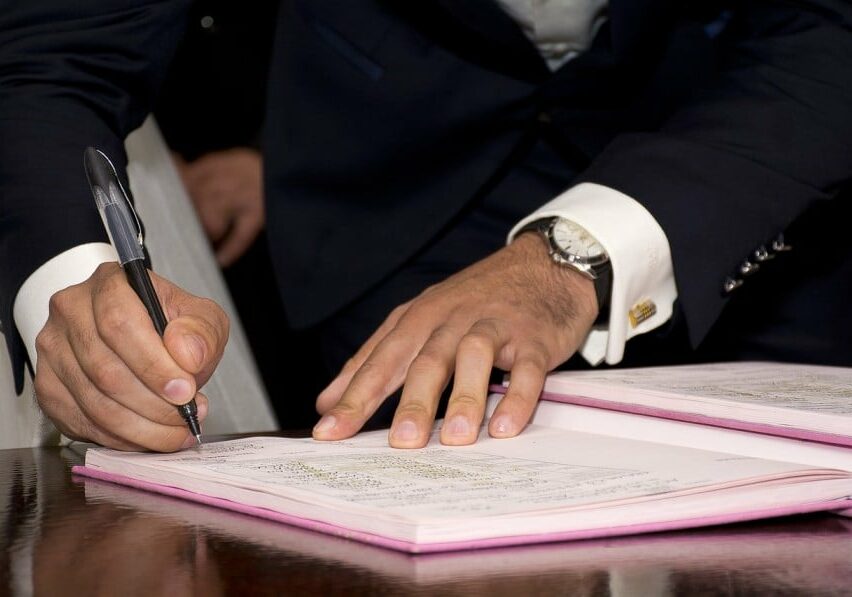Updated: July 4, 2025
When buying property in Portugal, you will come across a specific agreement called the Contrato de Promessa de Compra e Venda (CPCV). The CPCV Portugal is a promissory contract that holds significant importance in the property buying process as it provides substantial protection to buyers and sellers.
In Portugal, the CPCV acts as a preliminary agreement outlining the terms of a real estate sale before the final deed. It’s a legally binding preliminary agreement that precedes the final deed of sale, outlining the terms of the property transaction. The promissory contract confirms the buyer’s intention to proceed with the purchase and makes it difficult for either party to back out of the agreement, ensuring the sale’s completion and offering security to the buyer.
Although some sellers may suggest skipping this contract to reduce legal costs, doing so diminishes the buyer’s level of protection.
In this article, we’ll explain the role and importance of the promissory note. We will also explore:
- What is a promissory note?
- Promissory contract / promissory note terms and details
- Why the promissory contract (CPCV) is always a good idea
- Property deposits related to this written promise
- The benefits of a secured promissory note versus an unsecured one
Understanding Types and Uses of Promissory Notes and Promissory Contracts
So, what is a promissory contract? Is it the same as a promissory note?
The promissory note legal definition is a written, legally binding promise to repay a loan or debt under specific terms and conditions. It acts as a contract between a borrower and a lender. A promissory note typically includes the principal loan amount, interest rate, repayment schedule (including the due date and any installment amounts), and details about late fees or penalties.
Although potentially issued by financial institutions, other organizations or individuals can use promissory notes to confirm the agreed terms of a loan. It is sort of like an IOU with more legal weight. It’s usually simple and focused on repayment of a debt, like a loan agreement.
A promissory contract, on the other hand, is a broader and usually more detailed agreement — it lays out all the terms of an agreement between two or more parties, for instance, when buying a home.
As mentioned, in Portugal, the promissory contract acts as a formal agreement before the final deed is signed, where all the terms of a property sale can be outlined.
The Promissory Contract (CPCV) in Portugal
The promissory contract is a key step if you are considering buying a property in Portugal. The promissory contract is not mandatory, and you can proceed directly to the final deed signing (Escritura) without it.
Nonetheless, opting for the promissory contract offers substantial protection to the buyer, ensuring the completion of the sale. Some sellers may propose bypassing this step to minimize legal expenses for both parties, but doing so significantly reduces the level of protection you have as the buyer. It may also feel stressful to sign a contract with stringent terms, but it should be viewed as a significant step forward.
It is also possible to find a Portugal real estate lawyer, who charges reasonable attorney’s fees. The lawyer can assist you with drawing up the written agreement, understanding the subject matter hereof, and securing the promissory note in your favor.
Before this stage, it is relatively easy for the seller to withdraw from the agreement, and this does happen in Portugal.
There are various reasons why sellers may choose to pull out, including:
- The seller aims to relist the real estate to secure a higher price.
- In cases where the seller is a group of individuals, often siblings, not all of them may be willing to sell, and some may not even be aware that the property is on the market.
Signing the promissory note or CPCV significantly increases the likelihood of the sale proceeding. It defines the deal, specifying the property, purchase price, and payment date. While the deal may still fall through, at least you will have the advantage of having a written promise and reduced risk, with the CPCV protecting both parties.
Why the Promissory Contract is a Critical Part of the Buying Process
Another crucial aspect of the promissory contract is that it formalizes all the agreed-upon terms and ensures both parties sign the document. During the house viewing, you may have noticed specific issues or missing paperwork that warrant further investigation, such as the need for a survey.
When you raise these concerns, you may often encounter responses like “It’s fine” or “Don’t worry.” While sometimes it’s the seller’s agent being friendly, other times they may attempt to downplay the issues, hoping you’ll proceed with the purchase without addressing them.
The CPCV prevents such practices by allowing you and the seller to establish the contract’s terms. It is common to include conditions such as the sale being contingent on mortgage approval for the specified amount and the survey or property inspection not revealing any significant problems.
What’s more, the CPCV typically specifies what items will remain in the property upon completion of the sale. While it is not unheard of for sellers to take everything, including lightbulbs, it is equally common for them to leave everything behind. This is especially the case when they are selling a property previously owned by a deceased relative and have no interest in retaining dated furniture.
Issuance timing: When do you get a promissory note or contract?
The promissory contract is the preliminary agreement that comes before signing a future property purchase agreement. The purchase agreement, known as the Escritura in Portugal, finalizes the transaction, transferring ownership of the property from the seller to the buyer.
In the context of a mortgage loan agreement, a mortgage promissory note is put in place to ensure that the specified sum of money loaned, along with the interest, will be paid by the lender according to the agreed-upon terms. Your lender will typically provide you with a copy of the promissory note, along with several other documents, when you close on your home purchase.
Non-payment consequences: What happens if a promissory note is not paid?
The terms outlined in the promissory contract typically specify that if the buyer withdraws from the agreement, they forfeit the deposit. On the other hand, if the seller decides to back out, they usually have to compensate the buyer twice the deposit amount.
For mortgage loans, if the borrower defaults and does not repay the amount owed, the legal recourse could include repossessing any collateral the borrower put up against the promissory note, sending the debt to a collection agency, selling the promissory note (so someone else can try to collect it), or filing a lawsuit against the borrower.
What are the legal requirements for a promissory note template?
Every CPCV should contain specific details. Below, we’ve made a list of items that should be listed in this contract:
Promissory notes and contracts: The basic details
- Identification of parties: Identification of the buyer, seller, and their representatives, including names and contact information
- Property details: A comprehensive description of the property, including its habitation license and registration number
- Amount owed: The CPCV should clearly state the principal amount of the selling price for the property
- Details of the deposit and date of payments: Specification of the deposit amount, payment method, and clarification regarding any additional payments to be made between the promissory contract and the signing of the deeds (Escritura)
- Inclusion of any additional items or furnishings that are part of the sale
- Definition of the sale completion date and details of the witness when the deeds will be officially signed
- Provision outlining the course of action (for example, interest to be charged) in case of any delays in the payment schedule. Such provision should also include issues with real estate governing law, or property-related delays
- The CPCV should outline the conditions that each party must meet before the signing of the Escritura.
- The place the contract is entered into and to be enforced
- Signature line for all parties to sign
These elements ensure that the promissory contract includes crucial information and establishes the framework for the subsequent stages of the property transaction.
The Difference Between a Secured Promissory Note and an Unsecured Promissory Note
Just like with loans, you can get a secured promissory note or unsecured promissory notes. A secured promissory note is backed by collateral — like an asset or something of value — that can be claimed if the borrower fails to pay. Unsecured promissory notes, on the other hand, are not tied to any collateral, which makes it riskier for the lender.
In real estate deals, this matters. A secured promissory contract helps protect both parties and ensures the buyer’s deposit isn’t lost if something goes wrong. Unsecured agreements, especially verbal ones, leave buyers more exposed — especially if you’ve already handed over your deposit.
A secured promissory note and the professional services of a certified public accountant, real estate lawyer, or buyer’s agent will give you peace of mind and protect your interest as the buyer.
If the buyer or seller decides to pull out of a deal, promissory estoppel is always available. According to The Gazette of Official Public Records in the UK, promissory estoppel is like a safety net for promises. It prevents either party from backing out of a written promissory agreement or a promise when the other party has relied on it to their detriment.
Deposits According to Promissory Notes
One crucial stage in the property acquisition process involves placing a deposit and signing the promissory contract. After making an initial offer, the promissory contract confirms your intention to proceed with the purchase.
While submitting a deposit is a customary practice in numerous countries, it holds greater significance in Portugal due to the promissory contract (CPCV), which imposes significant obstacles for either the buyer or seller to withdraw from the agreement.
When entering into the promissory contract, it is customary for the buyer to provide a deposit, known as the Sinal, typically amounting to between 10 percent and 25 percent of the property’s value. Still, if both buyer and seller agree, this can be lower.
Payment according to the promissory agreement
Typically, the deposit is paid via a cheque or bank transfer, usually made payable to the seller directly or to the seller’s lawyer. It is worth noting that utilizing an escrow account to hold the deposit funds is not commonly observed in Portugal (an escrow account is a third-party account where funds are held before they are transferred from one party to another).
Key Takeaways About the Promissory Contract (CPCV)
Now that we understand the definition of promissory note or promissory contract, we can appreciate its importance. Although it may seem a time-consuming and stressful addition to the process of buying property in Portugal, the CPCV is an assurance and protection for the buyer.
Don’t bypass this; don’t let any seller or seller’s agent talk you out of signing a CPCV. In addition, make sure to use the help of a buyer’s agent, such as Goldcrest, to ensure that your best interests are always represented.
Additional legal documents for real estate transactions in Portugal
When investing in Portugal real estate, there are several other legal documents alongside the simple promissory note you will need for the entire agreement and settlement of real estate transactions.
Below, we will look at a few of the legal documents other than the promissory contract of Purchase and Sale that you will need to get to avoid any legal issues and protect your interest through your property-buying process. You can also consult our guide to property documentation in Portugal for more information.
According to the Portuguese Public Service portal, you will need the following documents to start the process:
- Property description document: A document issued by the Tax and Customs Authority containing property features and details
- Title search: Issued by the Property Registry, this document includes the information on the location and composition of the property and the owners.
- User license: Depending on the property’s Municipal Authority and state law, this document serves as proof that the property has been inspected and deemed legally compliant.
- Energy certificate: The National Energy Agency issues this document after confirming the energy efficiency of the property.
- Building data sheet: A document containing the technical and functional characteristics of the property
- Declaration of non-debt: After doing background checks on the property’s history, this document will be issued stating that there are no debts left to repay on the property.
Goldcrest: How We Can Help You
Goldcrest is a buyer’s agent that is based in Lisbon. We provide expert, impartial advice on real estate investments and how to buy property in Portugal. From scouting out the perfect property through to property acquisition, we have you covered throughout the process.
If you are looking to purchase property in Portugal, don’t hesitate to get in touch. Our team of skilled experts is available to solve all your real estate doubts, helping you with the property search and offering insightful expertise and strategic advice.
Why choose Goldcrest?
- Local knowledge: With offices located across Portugal, our presence nationwide allows us to assist you personally across the country.
- Independent service: As an independent buying agent, we do not represent any development or project. Our service is entirely tailored toward each individual client, providing you with everything you need to secure the perfect property at the best possible price. As an impartial advisor on the market, we work solely on behalf of our client and provide a service tailored to your needs and requirements.
- Streamlined process: Our real estate agents speak English and Portuguese, and our service is completely focused on providing you with a hassle-free buying experience, saving you time.
- Experienced team: Our expert real estate team has a vast local knowledge of the Portuguese property market. We have cutting-edge technology and metasearch tools at your disposal to provide full market coverage, ensuring the best investment choices and negotiated prices.
- Network of partners: We have a close network of partners, including lawyers, property management services, builders, architects, designers, and landscape gardeners, again saving you time and hassle by providing you with trusted experts in their field of work.
Frequently Asked Questions about the CPCV in Portugal
What is a promissory contract in Portugal?
A promissory contract is a legal document that, although not required for the purchase or sale of a property, protects the rights and obligations of both parties involved until the final agreement, the public deed, is executed. Simply put, it is a promise-to-pay contract or promise-to-pay letter that acts as a guarantee between the buyer and seller.
Is a promissory agreement a contract?
Yes, a promissory agreement is a legally binding contract. It is a legally binding agreement between two parties that establishes the terms and conditions for a specific transaction, often related to the sale or purchase of a property.
What is a CPCV in Portugal?
In Portugal, CPCV stands for Contrato de Promessa de Compra e Venda, which translates to “Promissory Contract of Sale.” It is a legal document that solidifies the buyer’s and seller’s intentions and obligations in a property transaction.
How does a promissory contract differ from other types of contracts?
A promissory note or promissory contract is more of a securities act that is based on an agreement between a buyer and seller confirming the intention to proceed with a property sale. One example of another type of contract that differs from this would be the Escritura, the final deed of sale where both parties sign the deed once full payment is made and the property is officially sold.
What are the essential elements of a promissory contract that must be met for a it to be valid in Portugal?
The promissory contract, also referred to as the promissory purchase and sale agreement, must include the following details:
- The identification of the buyer, seller, and their representatives
- A property description, habitation license, and registration number
- The principal amount of the selling price for the property
- The deposit amount, payment method, and clarification regarding any additional payments between the promissory contract and the signing of the deeds, including attorney fees, interest rates, exchange commission, and property taxes.
- All the conditions that each party must meet before signing the final deed.
- Deadline for completing the public deed
Is a written document required for a promissory contract to be valid?
It is not a strict requirement, and real estate agents representing the sellers may try to avoid drawing up a promissory note to avoid additional legal fees. However, having a written promissory note stating the intention to sell is highly advised in case the deal falls through.
Can a promissory contract be modified or canceled?
Once the CPCV or promissory contract is signed, it cannot be modified, but the buyer or seller of the property can cancel it. If either party seeks to cancel the agreement, the party canceling will be liable to pay double the 10 percent deposit paid with the CPCV.
Are promissory contracts legally binding and enforceable in court?
Yes, a promissory contract is a legally binding agreement in Portugal. Both parties are obligated to fulfill the terms agreed upon, and failure to do so can result in legal consequences.
If there is proof of a signed written agreement, promissory contracts are enforceable in court. If the buyer or seller decides to pull out of a deal, promissory estoppel is always available. In these cases, the courts will determine if it’s fair to hold someone to their word based on how much the promise affected the other person’s deposit, agreements for final payment, and financial position.
Can a promissory contract be registered in Portugal?
When a promissory contract for the purchase and sale of a property is signed, it can be registered at the Conservatory for Real Estate Registry (Conservatória do Registo Predial) to protect the promissory buyer’s future ownership rights against third parties.
As a result, if the seller tries to sell the property to someone other than the promissory buyer, the promissory buyer can enforce their rights through the courts, compelling the seller to honor the original agreement and transfer ownership of the property to them.
How can a promissory contract be terminated in Portugal?
A promissory contract can be terminated in Portugal by mutual agreement, fulfillment of its terms, or through legal action if there’s a breach. Specific conditions for termination should be outlined in the contract. This is referred to as the direito de retratação, the right to withdraw, and this can be stimulated in the promissory contract, allowing parties to back out under specific, mutually agreed conditions.
What legal remedies are available for breach of a promissory contract in Portugal?
In the event of a breach of contract, known as an Incumprimento in Portugal, the non-defaulting party has several options: They can seek to enforce the contract, activate a specific penalty clause, or terminate the contract and receive compensation based on the original deposit. Typically, the promissory seller keeps the original deposit, but the promissory buyer may be entitled to claim twice that amount.
Mutually agreed penalty clauses can also be included in the contract, known as cláusulas penais.
Much like the CPVC, a promissory note issued by a financial institution for a mortgage loan also protects both the buyer and seller in a property sale, such as if the borrower defaults or fails to honor the agreement of the loan amount.
Is it necessary to have a Notary public for a promissory contract in Portugal?
The promissory contract is usually signed in front of a Notary (Notário). This helps to ensure legal compliance, verifies the parties’ identities, and certifies the document’s authenticity.
What property taxes do you need to pay in Portugal?
When foreigners purchase property, they need to be aware of the various property taxes involved, both at the time of purchase and on an annual basis. During the purchasing process, these taxes include the Property Purchase Tax/Property Transfer Tax (IMT) and Stamp Duty.
On an annual basis, owners are required to pay the Municipal Property Tax (IMI). Additionally, if you plan to sell your property, you should consider the Capital Gains Tax. For more information, refer to our article: Property Taxes in Portugal 2025: An Overview.
What is the difference between a promissory note and a contract?
Let’s first answer the question: What is a promissory note? A promissory note is a written promise by one party to make a payment of money at a date in the future. Although potentially issued by financial institutions, other organizations or individuals can use promissory notes to confirm the agreed terms of a loan. It’s usually simple and focused on repayment. A contract, on the other hand, is broader — it lays out all the terms of an agreement between two or more parties, like buying a home, timelines, obligations, penalties, and more.
In Portugal, the promissory contract (Contrato de Promessa de Compra e Venda) is a formal pre-sale agreement with detailed conditions, not just a written promise to pay.
What is the difference between a promissory note and an IOU?
An IOU is a basic statement that just says that someone owes money, without many details. A promissory note goes further: It includes the amount owed, the repayment date, interest (if any), and both parties’ signatures. It’s much more formal and enforceable than an IOU.
Is a promissory note legally binding?
Yes, it is. As long as it includes all the essential elements — amount, repayment terms, signatures — it’s a legally binding agreement. While not essential, you can have the promissory note notarized to add extra legal protection.
What are the disadvantages of a promissory note?
While promissory notes are useful, they’re not bulletproof. If the terms are vague or not properly written, it can lead to misunderstandings or legal headaches. Plus, enforcing them through the courts can take time if things go south.



